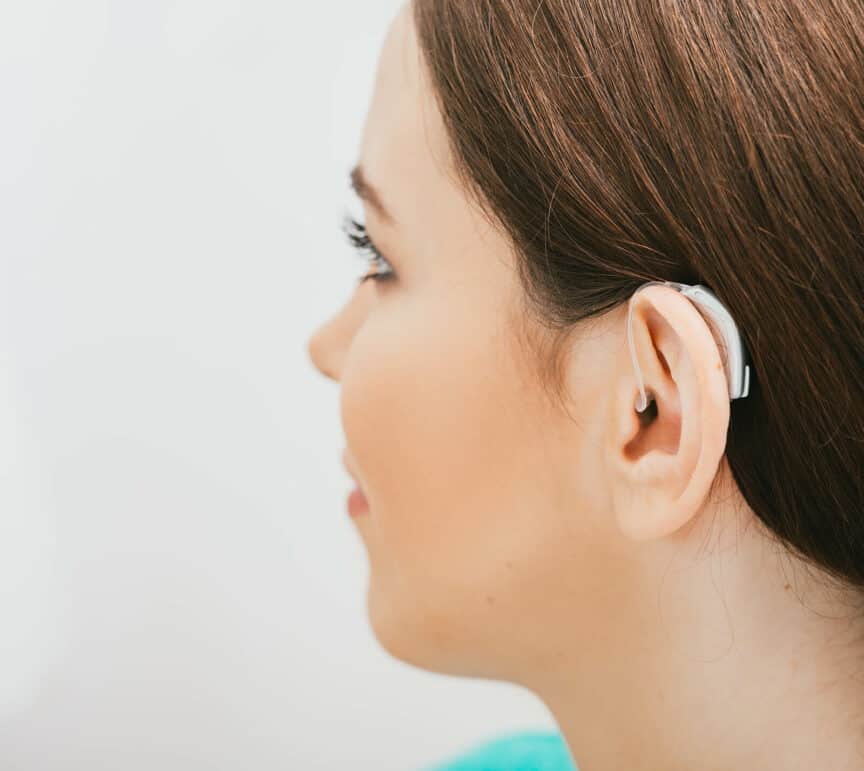If you have hearing loss, you’ve probably been thinking about getting hearing aids. When facing the prospect of choosing the right hearing aids, individuals embark on a journey to rediscover the nuances of the sounds around them. This guide seeks to demystify the process of choosing the right hearing aids, offering insights into the considerations that go into selecting hearing aids.
Start With a Hearing Test
Before choosing the perfect device for your hearing loss, it’s crucial to understand more about your hearing abilities. A comprehensive hearing test, conducted by a qualified hearing health specialist, serves as the best starting point to learn more. This test evaluates the range and nature of your hearing loss, laying the foundation for personalized solutions.
Technological Considerations
Digital vs. Analog:
Modern hearing aids leverage digital technology, offering superior sound quality and customizable features. Digital aids can adapt to various listening environments, distinguishing between speech and background noise. While analog options still exist, digital technology has become the standard for its advanced capabilities.
Directional Microphones:
Directional microphones enhance your ability to focus on specific sounds while minimizing background noise. This feature is especially beneficial in social settings, allowing wearers to engage more effectively in conversations.
Wireless Connectivity:
The integration of wireless connectivity has revolutionized the hearing aid experience. Many devices now offer seamless connections to smartphones, TVs, and other audio sources, providing wearers with enhanced accessibility and control.
Rechargeable Batteries:
Traditional disposable batteries are giving way to rechargeable options, providing convenience and reducing environmental impact. Rechargeable hearing aids typically offer a full day of use on a single charge, eliminating the hassle of constantly replacing batteries.
Tinnitus Management:
For individuals experiencing tinnitus or a persistent ringing in the ears, some hearing aids incorporate specialized features for tinnitus management. These devices can produce soothing sounds or white noise to alleviate the perceived noise associated with tinnitus.
Finding the Perfect Fit
When it comes to picking the perfect hearing aid for your hearing loss and lifestyle, you’ll want to consider what style of hearing aid you want:
- In-the-Ear (ITE): ITE hearing aids sit discreetly in the outer portion of the ear. They are custom-made to match your ear’s contours, making them comfortable and cosmetically appealing. ITE styles are suitable for mild to severe hearing loss.
- Behind-the-Ear (BTE): BTE devices house the technology in a casing that rests behind the ear. A clear tube directs sound into the ear canal. BTE hearing aids are versatile, suitable for various degrees of hearing loss, and often chosen for their durability and ease of use.
- Receiver-in-Canal (RIC): RIC hearing aids are similar to BTE but with a smaller casing and a receiver placed in the ear canal. This design allows for a more discreet appearance while maintaining the benefits of BTE technology.
- In-the-Canal (ITC) and Completely-in-the-Canal (CIC): ITC and CIC hearing aids are custom-fit devices that sit inside the ear canal. They offer a cosmetically appealing solution, though their size may limit some features. These styles are ideal for mild to moderate hearing loss.
Lifestyle Considerations
Individuals with active lifestyles may prioritize moisture resistance, durability, and features like wind reduction. Consideration should also be given to devices that can seamlessly integrate with sports gear and accessories.
For those who embrace technology, hearing aids with advanced connectivity options, smartphone apps, and compatibility with other smart devices may be a perfect match. These features enhance the overall user experience and control.
Cosmetic preferences can play a significant role in the decision-making process. Some individuals prefer discreet styles that blend seamlessly with their natural appearance, while others may view their hearing aids as a fashion statement.
Budgetary Considerations
The cost of hearing aids varies based on technology, features, and brand. Establishing a realistic budget and discussing financing options with your hearing health specialist ensures a balance between your hearing needs and budget.
Visit Us Today
In the pursuit of the perfect hearing aids, the guidance of a professional hearing health specialist is invaluable. We are experts in the field, and we’ll provide personalized recommendations based on your hearing test results, lifestyle, and preferences. Our team of hearing health specialists will ensure that your devices fit seamlessly with your unique auditory needs.

